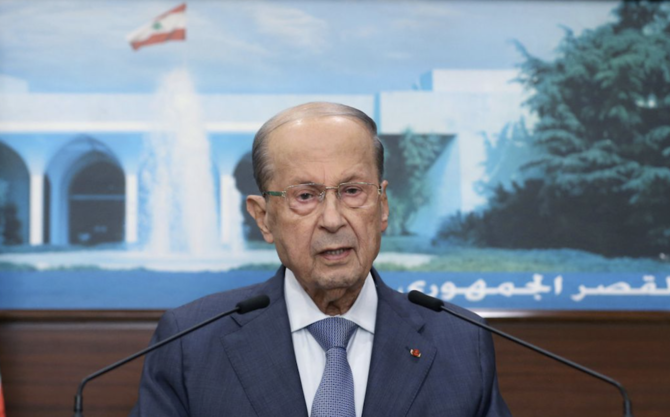BEIRUT: Lebanese President Michel Aoun has sent a law amending legislative election rules back to parliament for reconsideration, the presidency said in a statement.
Aoun did not sign the law, to which parliament introduced some amendments. He has requested that these amendments be reconsidered.
Aoun’s objection comes after the Free Patriotic Movement bloc raised its opposition to holding elections in March instead of May because it “narrows its margins of action.”
During the legislative session of Oct. 19, the bloc also objected to proposals to change the expatriate voting formula by canceling the six allocated seats and allowing expatriates to vote for the electoral lists.
The FPM sought to allocate these six seats in the electoral law, provided that voting for these representatives would take place in the 2022 elections.
Parliament Speaker Nabih Berri called on the parliamentary committees to convene next Tuesday to discuss Aoun’s response to the electoral law.
Observers described these developments as a sign of a political struggle for the presidency.
The parliament to be elected in March is expected to pick the new president after Aoun’s term ends in October.
In the decree in which he requested a review of the amendments, Aoun said that “shortening the constitutional deadline for the elections could prevent voters from being able to exercise their electoral right due to the natural and climatic factors that often prevail in March, making it impossible for voters to reach their polling stations, not to mention the cost of transportation and the inability to supply polling stations with electricity.”
He added: “This could also prevent voters residing outside Lebanon from exercising their political right preserved in the current electoral law by voting for their representatives in the electoral district designated for non-residents.”
The president said that the amendments to the law deprive the right to vote from 10,685 citizens, who would reach the age of 21 between Feb. 1 and March 30, 2022.
Zeina Helou, an elections expert, told Arab News: “Aoun is trying to pull strings in order to later accuse the other political parties of preventing him from carrying out the reforms he wanted.”
She added: “Aoun and his political team prefer to gain more time to conduct the elections rather than move the date up.
“Freezing the voter lists will deprive new voters who would soon turn 21 from the right to vote, and this may be a reason to appeal before the Constitutional Council.”
Helou added that “the FPM fears that Christian voters who live in Greater Beirut will not go to the polling stations in their remote villages and towns in Akkar, in the north, the south, and Baalbek-Hermel, either because of the high prices of gasoline or because of the stormy weather in the mountains in March, and insists on Mega polling centers.”
She noted that “this process requires a lot of time to be arranged, but I doubt that the rest of the political parties want these polling stations in the places where voters live because they lose the ability to control their voters and know who they voted for.”
Helou pointed out: “The Shiite duo, Hezbollah and the Amal movement — unlike Aoun and his political team — do not fear the upcoming elections. Hezbollah does not derive its legitimacy from the elections but from its weapons and power.
“Hezbollah is able to obstruct any parliamentary session, just as it is currently obstructing holding cabinet sessions until Tarek Bitar, the judge leading the investigation into the Beirut port blast, is removed. The second Hezbollah feels threatened, it will turn the tables.”
Justifications for disrupting the elections in March may already be in motion, regardless of constitutional reasons that may or may not be taken into account.
Helou told Arab News that FPM head MP Gebran Bassil — who has always wanted to become president — may benefit from the current developments and reap rewards elsewhere.
Although the political parties believe it is still too early to discuss what the upcoming parliamentary elections will bear, Helou said that in 2018, the elections were held amid understanding and settlements between the political parties in power, while in 2022 they will be marked by tug-of-war and alliances.
“The same parties could be re-elected and regain their seats in parliament, and we may see a low voter turnout for lack of convincing alternatives.”
Next Tuesday, parliament is expected to either approve Aoun’s request, which requires the votes of 61 MPs, or appeal it before the Constitutional Council.
Parliament could also introduce some amendments to the law, which requires the votes of half of the quorum plus one; if the quorum is 65 MPs, the law would need 33 votes.

